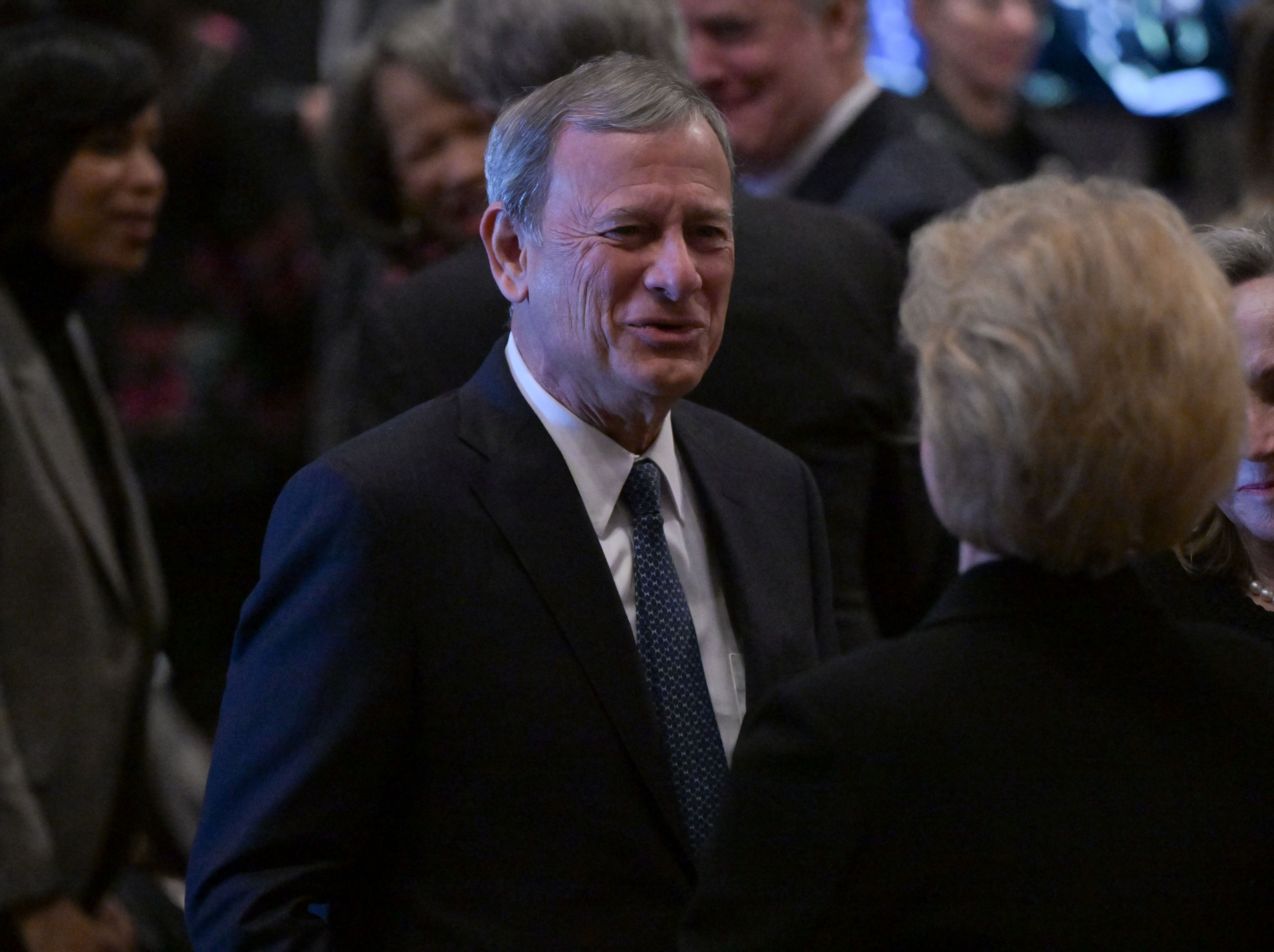Chief justice delivers traditional toast to president at Historical Society dinner

Inside the Supreme Court’s main corridor known as the Great Hall, Chief Justice John G. Roberts Jr. rose from his chair Monday night to formally open an annual dinner with a traditional toast to the president.
For decades, the sitting chief justice has delivered the same seven-word toast at the start of Supreme Court Historical Society dinners he attends, no matter who is in the White House.
“To the president of the United States,” Roberts boomed, his glass raised as his voice echoed through the hall lined with monolithic marble columns that lead to the courtroom.
Veterans of the Historical Society’s annual gathering had heard it before and were unfazed. But the chief justice’s toast — his only remarks of the evening — were somewhat jarring to the law firm summer associates, young lawyers and others in attendance for the first time. They exchanged quizzical looks after Roberts spoke, asking one another whether the chief justice had really said what they heard.
Roberts’s salutation seemed discordant with his recent assertions of judicial independence and at a time when the Supreme Court is being pulled into a slew of challenges to President Donald Trump’s initiatives to upend the federal bureaucracy and immigration policy and to dramatically expand presidential power.
In March, the chief justice issued a stern statement rejecting Trump’s calls for the impeachment of a federal judge who ruled against the administration, and Justice Ketanji Brown Jackson forcefully condemned what she characterized as the relentless attacks, disregard and disparagement that judges around the country are facing on a daily basis.
Carter G. Phillips, the president of the Historical Society who was a law clerk to Chief Justice Warren E. Burger, said Tuesday that the toast from Roberts was all about tradition. Every formal meal Phillips has attended at the Supreme Court dating to 1978 has opened with the same tribute to the president.
“It’s not a political statement. It’s just respect for the office,” said Phillips, a Supreme Court litigator who attended the dinner and sat one table over from the chief justice. “It would have been stranger not to do that; that would have been political.”
The annual Gridiron Club and Foundation dinner for D.C.’s political and media elite has long closed with the same toast to the president. Trump did not attend this year, and the evening instead ended with “A toast to the First Amendment.”
James Duff, executive director of the Historical Society, did not know the exact origins of the toast that he first learned about in the 1970s. When asked whether there was talk of updating the tribute, he said, “It’s just more consistent to stick with tradition.”
Nichole Francis Reynolds, a new trustee with the society, observed first-time guests at Monday’s dinner initially surprised when they heard the toast.
The tradition “underscores the profound respect accorded to the nation’s highest office,” she wrote in an email. “The society’s mission is to educate the public about the Supreme Court’s rich history, including such time-honored customs.”
“These traditions remind us of the reverence for our constitutional framework and important relationship among our three co-equal branches of government,” she wrote.
Burger created the nonprofit charity in 1974 to preserve and increase public awareness of the court’s history through lectures, research, educational activities and court displays.
The annual dinner for members, which costs $500 a ticket, celebrates the society’s work and its donors, including large law firms and lawyers. In past years, several justices have attended the dinner or stopped by the reception held either in the court’s elegant conference rooms or on the ground floor amid elaborate displays of the court’s landmark cases.
The dinner has also been the subject of controversy. Last year, Justice Samuel A. Alito Jr. and his wife, Martha-Ann Alito, were secretly recorded by a liberal documentary filmmaker discussing the nation’s political divide and ethics controversies surrounding the couple.
The organization and its annual dinner were also the subject of a 2022 article in the New York Times detailing how donors have sought to use it to gain access to the justices.
This year, none of the justices showed up for lobster rolls at the pre-dinner reception, with several telling organizers they are crunched for time as they finish writing and preparing to announce about 30 remaining opinions before the court’s term ends in late June.
Roberts was the only one of his colleagues to attend the dinner, at which guests dined on a choice of seared rockfish or thyme roasted sirloin served on blue-and-gold-rimmed china.
The Washington Post purchased a ticket and membership for a reporter to attend the dinner.
The email confirming attendance at the society’s meeting and dinner came with a bolded note prohibiting guests from using recording devices, cameras and cellphones — and a warning that using such devices “will result in forfeiture” of membership.
Post a Comment